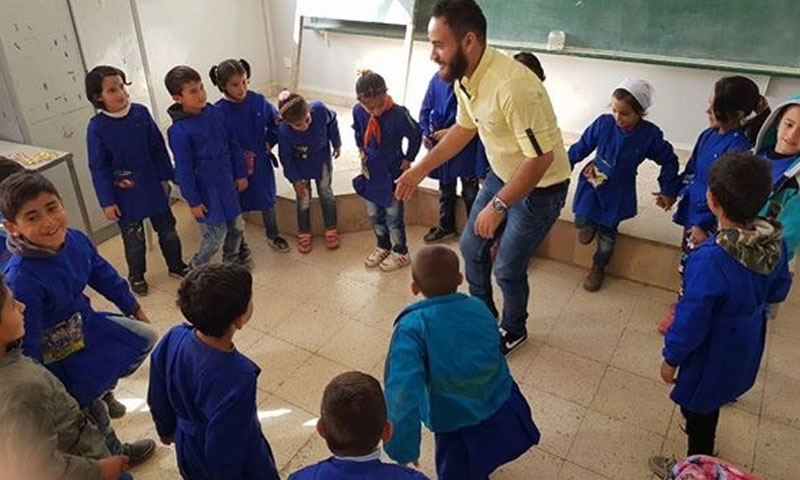Following the “Islamic State’s” attacks that targeted Sweida last July, a number of teachers and students, graduates of the departments of Psychology and Psychological Counseling, at the Faculty of Education, in the city have launched a volunteering initiative, seeking to support the families of the eastern villages of the governorate, under the name “Advocates of Life, We Will Always Be.”
The initiative’s idea resulted from the suffering of the families and children; loss, the scenes of murder, panic and fear that accompanied the massacre. According to what one of the initiative’s participants has told Enab Baladi, the society, generally, tends to ignore the psychological impact of such incidents and the people’s failure to continue with their lives, if they were not helped to gain psychological flexibility back and to overcome the shocks with the least psychological loss possible.
The female participant, on the condition of anonymity, said that her team hopes that the initiative would turn into a model of social solidarity and the unconditional cooperative volunteering work, away from competitiveness, conflict and personalization.
A Positive Response
A women teacher in the village of al-Mtoneh, one of the initiative’s targets, explained to Enab Baladi that the students developed after the sessions of discharge and learning how to overcome shocks.
She said that early this year, the students were violent against each other and liable to laziness and abstractedness, but with the session their will increased, and the psychological team managed to win their trust and love, which gave the children a trigger to show the team a sense of joy as a form of gratitude, according to the teacher.
The initiative’s team divides its activities into groups, and the Education Department’s students formed a psychological support team to cover the children’s needs in three cities; Shahba, Salkhad and Sweida.
These groups have special names: “The Melody of Life,” “Blossoms of Humanity,” “Blossoms of Pomegranate,” and “Blossoms of Almond.”
One of the initiative’s student participants said that it aims to link the university and its staffs with the society and its psychological needs under the current crisis, in addition to the presence of volunteering teams, who are working on the specialized psychological and educational program, which offers psychological and educative services.
Networking with Local Associations
The initiative’s team faced many challenges relating to the mechanism of entering the schools in the eastern countryside, for entrance requires a permission and a license to reach the students and address their needs.
Due to this, the team had to create relationships with the local associations on the ground, spreading in most of the governorate’s areas, and according to one of the initiative’s participants, the team, in Sweida, cooperated with the “Social Development-Self-Improvement Committee”. According to this, the first phase of the initiative was implemented with 50 children.
The team also cooperated with the “Department of Ecumenical Relations- Child Protection Department,” according to which they implemented a joint event in the past a few days, in addition to cooperation with the “Bayte Ana Baytak” Organization (My Home is Your Home), which provided the transportation costs for the children during the last week of the first phase.
The former event lasted for about 20 days, during which, according to the participant, a psychological support program was conducted, including guided psychological activities, aiming at emotional discharge and preliminary diagnoses and a review of the children’s information, as well as preparing them for the school. The second phase covered a larger number of affected children, with continuing to offer help to children of the first phase.
The participant explained that the psychological support journey in Salkhad, started with an ice breaking session, introducing psychological support to the trainees and the targeted group, date and location, a model (look, listen and relate), and the application of this model through role playing techniques.
The participant said: “Familiarity was built, the effective communication tools and their practical application was clarified, in addition to the knowledge gained about what to do and what not to do during the psychological support sessions and the role that teachers play relating to psychological support.”

